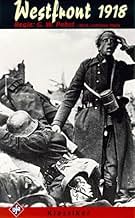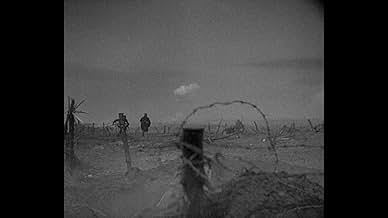IMDb-BEWERTUNG
7,3/10
2658
IHRE BEWERTUNG
Eine Gruppe deutscher Soldaten kämpft am Ende des Ersten Weltkriegs in Frankreich an der Front.Eine Gruppe deutscher Soldaten kämpft am Ende des Ersten Weltkriegs in Frankreich an der Front.Eine Gruppe deutscher Soldaten kämpft am Ende des Ersten Weltkriegs in Frankreich an der Front.
- Regie
- Drehbuch
- Hauptbesetzung
- Auszeichnungen
- 1 wins total
Hans-Joachim Möbis
- Der Student
- (as H.J. Moebis)
Aribert Mog
- Undetermined Secdondary Role
- (Nicht genannt)
Gustav Püttjer
- Hamburger
- (Nicht genannt)
André Saint-Germain
- Undetermined Secondary Role
- (Nicht genannt)
Vladimir Sokoloff
- Meal Orderly
- (Nicht genannt)
Ilse Trautschold
- Undetermined Secondary Role
- (Nicht genannt)
Emil Wabschke
- Undetermined Secondary Role
- (Nicht genannt)
Empfohlene Bewertungen
Invariably any piece of art banned by the Nazis as degenerate or in this case "cowardly defeatism" has something to offer. G.W Pabst crafts a powerful antiwar film by simply showing so many of its truisms - the senseless, horrific death of course, but also many other subversive elements, e.g. the possibility of friendly fire, the idiotic decisions made by leaders who are out of harm's way being served posh courses of food, one's wife or girlfriend being unfaithful, and the psychological trauma. At his best he simply leaves the camera stationary in longshot while men scurry about and kill one another for no good reason, letting the viewer draw their own conclusion about the madness they're witnessing.
I have to say though, the impact of it all was a little lessened because the images and concepts weren't as novel for me 90 years later, as unfair to the film as that might be. It lags as well when it's off the battlefield, showing among other things an uninteresting (and long) performance at a canteen, and the confrontation with the wife in bed with another man. I think it was trying to balance out the warfare and build up characters so that we were invested in them, but I struggled to stay interested (this and the bleakness of the thing make it one I wouldn't reach for again). Kudos to Pabst for making it, and I loved the way he closes it with "The End?!", certainly well aware of growing militarism and possibility for another devastating war.
I have to say though, the impact of it all was a little lessened because the images and concepts weren't as novel for me 90 years later, as unfair to the film as that might be. It lags as well when it's off the battlefield, showing among other things an uninteresting (and long) performance at a canteen, and the confrontation with the wife in bed with another man. I think it was trying to balance out the warfare and build up characters so that we were invested in them, but I struggled to stay interested (this and the bleakness of the thing make it one I wouldn't reach for again). Kudos to Pabst for making it, and I loved the way he closes it with "The End?!", certainly well aware of growing militarism and possibility for another devastating war.
Director G.W. Pabst uses sound well in this, his first sound film. There's the noise of continual bombardment, which adds to the visual realism. Moreover, sound serves continuity. Whistling continues from one scene to another in one transition; in another, the music of a band playing at a canteen turns into the drumbeat for marching soldiers. Also endearing of this antiwar statement is that it is not exciting, unlike other supposedly dovish pictures that end up romanticizing battle. There's the screaming Frenchman between trenches. An artillery firing line is too short, hitting patriot trenches. A return home on leave has a soldier discovering that his wife trades sex to get by.
The framing, editing and visual quality are adept, as one would expect from Pabst, if not from an early sound film. I especially liked the framing and fluidity of the staircase goodbye. There's a surveying moving camera, as there is in "All Quiet on the Western Front". The long battle sequence at the end is the climax of the salient film-making. There is a very long take from an unmoving position, as if the camera were a hidden soldier observing; it is unexciting, yet my attention was not discouraged.
The framing, editing and visual quality are adept, as one would expect from Pabst, if not from an early sound film. I especially liked the framing and fluidity of the staircase goodbye. There's a surveying moving camera, as there is in "All Quiet on the Western Front". The long battle sequence at the end is the climax of the salient film-making. There is a very long take from an unmoving position, as if the camera were a hidden soldier observing; it is unexciting, yet my attention was not discouraged.
My husband and I just finished seeing this movie. We hadn't heard of it before. We were quite impressed. It's an old movie. It was made just at that time when overacted stage conventions were being abandoned for the more subtle gestures of film. Taking that into account, this movie for us packed quite a wallop.
This is a movie about people attempting to fight a war as a group of small-towners who get to know each other and build a society as they go. Although they don't like the war, they are willing to go and do their part. But can these deep relationships endure in the face of an impersonal war machine? And whose fault is it if they can't? Who is responsible for the situation?
There's a fairly slow start, during which the movie establishes relationships, etc. Then there is a decisive battle. Somehow there isn't another trench warfare movie I can think of which really gets the nuances and habits of the people who were in the trenches in World War I, on either side. We don't have anything like it now. And yet it's not gruesome, so don't be worried about that. I'd definitely recommend this movie, especially in mid-2006 in the U.S. This movie asks all the right questions, subtly but effectively.
This is a movie about people attempting to fight a war as a group of small-towners who get to know each other and build a society as they go. Although they don't like the war, they are willing to go and do their part. But can these deep relationships endure in the face of an impersonal war machine? And whose fault is it if they can't? Who is responsible for the situation?
There's a fairly slow start, during which the movie establishes relationships, etc. Then there is a decisive battle. Somehow there isn't another trench warfare movie I can think of which really gets the nuances and habits of the people who were in the trenches in World War I, on either side. We don't have anything like it now. And yet it's not gruesome, so don't be worried about that. I'd definitely recommend this movie, especially in mid-2006 in the U.S. This movie asks all the right questions, subtly but effectively.
This movie has an awful lot in common with another film that also debuted in 1930. Both this film and ALL QUIET ON THE WESTERN FRONT are terrific World War I films that give an awful and realistic view of the war from the perspectives of ordinary German soldiers. As a result, both are also profoundly anti-war films that were later banned by the Nazi government that took power just a few years later. Of the two, ALL QUIET ON THE WESTERN FRONT is a slightly better film because it has an excellent back story (in other words, setting up the characters and giving them some depth). Instead, WESTFRONT 1918 is more like a hidden camera that just shows parts of the war--only towards the very end of WWI. Also, unlike ALL QUIET, this film only once follows one soldier home and shows life outside the battlefield. Mostly, the film is just one battle scene after another after another. Despite seeming a tiny bit out of context because of this, it is still a super effective and moving piece of film. A truly well-made and exceptional film with ultra-gritty realism. It is occasionally tough to watch, as there are corpses everywhere and the action is often up close and very personal.
As I said, this film isn't quite as perfect and profound as ALL QUIET ON THE WESTERN FRONT, though it actually is better than the exceptional French film, J'Accuse or THE EAGLE AND THE HAWK--two other terrific WWI films that emphasize the futility and waste of this stupid war.
As I said, this film isn't quite as perfect and profound as ALL QUIET ON THE WESTERN FRONT, though it actually is better than the exceptional French film, J'Accuse or THE EAGLE AND THE HAWK--two other terrific WWI films that emphasize the futility and waste of this stupid war.
Very much worth viewing. I caught it on Turner Classic Movies recently, and was very pleasantly surprised by the quality of this film.
This film transcends the limitations of the sensibilities of the time and the special effects available to movie makers. It makes no sweeping statements or judgments about war and aggression. It simply gives you a glimpse of what it was like to live and die in the trenches of The Great War.
Although not as intense as "All Quiet on the Western Front" (whose subject matter it shares), it has its moments of artistry. It is also more narrowly focused than "All Quiet..", but its story is compelling and riveting. Should be in anybody's serious list of worthy war movies.
This film transcends the limitations of the sensibilities of the time and the special effects available to movie makers. It makes no sweeping statements or judgments about war and aggression. It simply gives you a glimpse of what it was like to live and die in the trenches of The Great War.
Although not as intense as "All Quiet on the Western Front" (whose subject matter it shares), it has its moments of artistry. It is also more narrowly focused than "All Quiet..", but its story is compelling and riveting. Should be in anybody's serious list of worthy war movies.
Wusstest du schon
- WissenswertesThis film was banned by the Nazis after they came into power in Germany in 1933.
- PatzerThe depth of the trenches is inaccurate. In several scenes where the soldiers are standing up, their heads are higher than the top of the trench, making them easy targets for snipers and also allowing the French to monitor troop movements.
- Zitate
Woman in rationed food line: What are you doing? Back of the line!
Another Woman in rationed food line: What's wrong with the old cow? Cutting in line!
Man in rationed food line: Leave the woman alone.
Woman cutting in rationed food line: My Adolf is dead.
Woman in rationed food line: Think you're the only one? That's no reason to cut in line. Go to the back!
- VerbindungenEdited into A Hellish Chaos (2017)
Top-Auswahl
Melde dich zum Bewerten an und greife auf die Watchlist für personalisierte Empfehlungen zu.
- How long is Westfront 1918?Powered by Alexa
Details
- Erscheinungsdatum
- Herkunftsland
- Sprachen
- Auch bekannt als
- Vier von der Infanterie
- Drehorte
- Produktionsfirmen
- Weitere beteiligte Unternehmen bei IMDbPro anzeigen
- Laufzeit
- 1 Std. 37 Min.(97 min)
- Farbe
- Seitenverhältnis
- 1.20 : 1
Zu dieser Seite beitragen
Bearbeitung vorschlagen oder fehlenden Inhalt hinzufügen


























